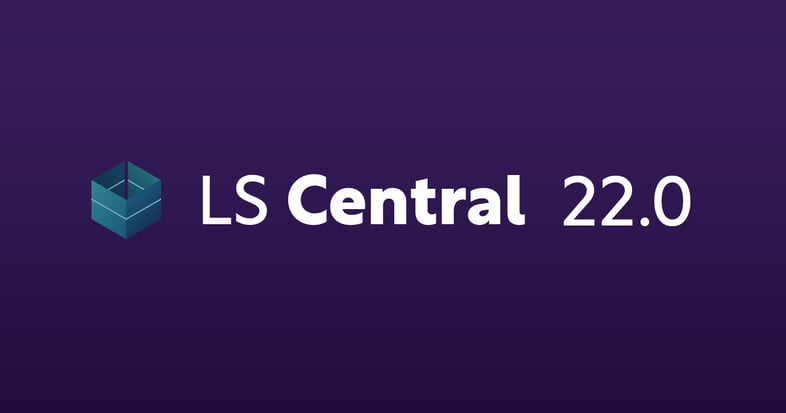LS Central 22.0: new universal code compliance and improved functionality

LS Central version 22.0 was released on May 25th, 2023. Here’s an overview of what we have added and improved in the system.
LS Central is now Universal Code compliant
LS Central is now Universal Code compliant. This means that the property Target in the app.json files for LS Central and LS Central system apps have been set to Cloud.
Customers who have the granule Implemented code is not cloud-optimized in their license can ask for this granule to be removed once they have upgraded to LS Central 22.0 unless there are other extensions installed that are not Universal Code compliant.
Windows authentication for web services no longer available for on-premises customers
Windows authentication was one of the methods used for web service authentication in LS Central and was based on the Business Central Windows authentication code. However, the Business Central Windows authentication code is marked as On-prem and cannot be used by Universal Code compliant applications, which now includes LS Central version 22.0.
This means that on-premises customers must switch from Windows authentication to either Basic authentication (Web Service Access Key) or Oauth authentication for web services before upgrading to LS Central version 22.0.
Please note that SaaS customers will not be affected by this change as the only authentication method supported in SaaS is Oauth authentication.
Replenishment: enhancements to out-of-stock functionality
The out-of-stock functionality in replenishment has been enhanced to include features that will improve maintaining and visualizing out-of-stock data.
Better out-of-stock data maintenance
You now have the option to perform out-of-stock calculations only on items and store locations that are active for replenishment in the system. When you enable this option, only the items and stores that have been set up for the replenishment calculation will be included in the out-of-stock calculation result. This gives you a clearer overview of out-of-stock situations for the items or store locations that have been selected for active replenishment, and you can also delete old or irrelevant out-of-stock data. Store locations that do not have a valid item distribution setup will be excluded from the out-of-stock calculation.
Improved visualization of the out-of-stock data
We have added a page called Replenishment Out of Stock Overview, which gives you a more intuitive view of your out-of-stock conditions. You can format the page to display an overview of your out-of-stock situations based on various parameters and filters, such as specific items, product groups, or locations. The overview can be grouped by out-of-stock situations that have started, ended, or were ongoing during a specific period.
You can also access out-of-stock overview charts to visualize how out-of-stock situations are distributed across different item groups and locations. This gives you better insight into the inventory movement for all your items in each store location.
LS Central for restaurants
Better KDS distribution for multiple kitchens
You can now specify a menu type for different Kitchen Display Systems (KDS). With this new setting, the menu type will be applied to the appropriate KDS, making it easier to send items automatically to the correct kitchen.
Bookings for LS Central
Improved visibility of dietary and allergy information for activity members
It is now possible to add comments about dietary preferences or allergies to specific activity members and automatically apply this information to their table reservation. When the reservation is made, your staff can clearly see important dietary information within the booking. You can also set up the system so that this information gets sent straight to the kitchen once the activity member has placed their order.
LS Central for hotels
More flexible folio management
We have made it possible to set up different invoices based on your customers’ needs. For example, if you’re dealing with a travel agent, you can provide an invoice for the accommodation costs and for other related costs such as spa services or breakfast charges. You can also provide guests with a separate invoice for food charges and for alcoholic beverages. This option makes it easier for you to split up invoices for your customers and give them a clearer overview of specific costs.
Easier set up of specific deposit and cancellation schedules
It is now easier to create more complex deposit and cancellation schedules based on your hotel’s desired policy. For example, you can set up a deposit schedule in the system so that guests pay 20% of their reservation on the confirmation date, 50% a month prior to arrival, and then 100% a week prior to arrival. Similarly, you could set up a cancellation window and charge guests accordingly. For example, if a guest cancels two weeks prior to arrival, then they must pay the first night room rate, but if they cancel two days prior, then they must pay 50% of the reservation.
New LS Central for forecourt functionality available
LS Central for forecourt has been upgraded and released for on-premises. The forecourt module is a separate extension that includes functionality for the POS to communicate to pumps through the hardware station and sell fuel items. This is the functionality that was previously in the Forecourt Manager for the Windows POS. The connection to the forecourt controller that was previously implemented in a DLL now exists through the hardware station where a special implementation is needed for each type of forecourt controller.

